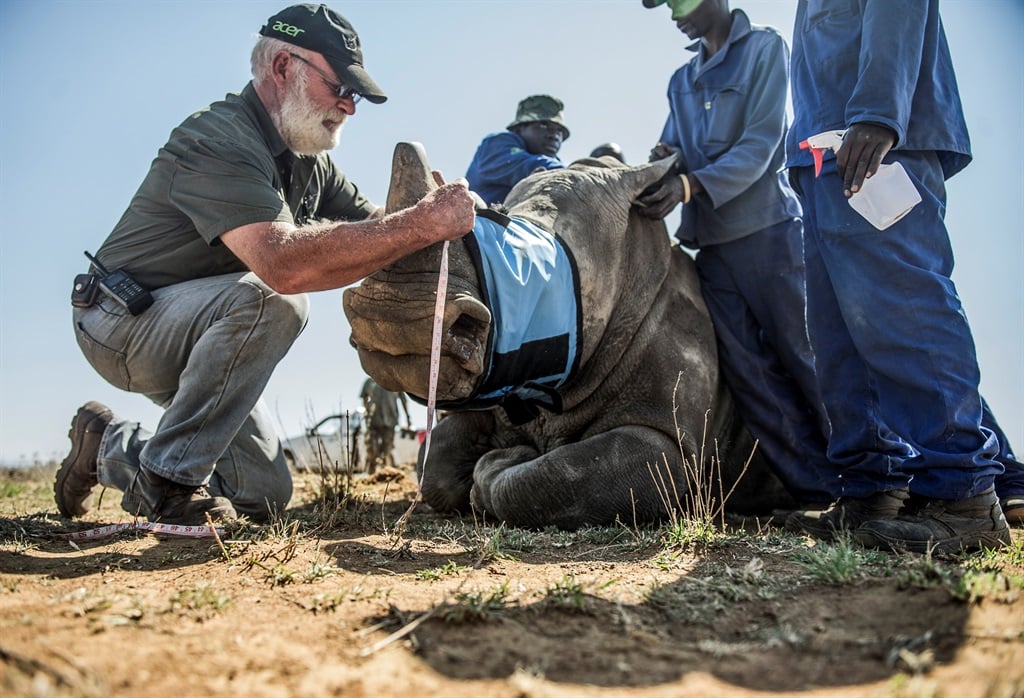
- Customs officials are on high alert for 50 rhino horns, stolen from a North West stockpile.
- Experts say the horns could be smuggled out of the country in a multitude of ways.
- Since 2015, SARS has confiscated more than R505 million in rhino horns at ports of entry.
Fifty rhino horns stolen from a stockpile in the North West will likely leave South Africa as beads, mugs, or souvenirs, experts have said.
The stockpile was stolen in the early hours of Monday morning from the North West Parks and Tourism Board in Mahikeng.
Reports suggest the robbers evaded security measures, alarms, security cameras and bypassed the locking mechanism of the vault.
Experts have speculated that the rhino horns may already be on their way to Asian markets, based on insights into how wildlife crime syndicates operate.
Martin Ewi, Institute for Security Studies Southern Africa's organised crime observatory coordinator, said a kingpin in a market country, such as China or Vietnam, would usually order a supply of rhino horn from another kingpin in a source country, such as South Africa. He would then hire a broker or middleman with connections in the government and security agencies to plan the robbery.
The broker will know the facility’s layout and security systems – often supplied by an insider – and will have planned an escape route based on police response methods.
READ | A DRC park just got a starter pack of white rhino from SA, in a fight against extinction
Once the plan is in place, "foot soldiers" with specific skills would be hired to carry out the robbery.
Once stolen, the horns are moved “relatively quickly”, said Ewi.
The broker will arrange for the haul to be taken to a facility, where it will be “transformed” into another item, such as a souvenir, said Ewi.
Mary Rice, executive director for the Environmental Investigation Agency, said criminal networks would transport the horn by air or sea directly from South Africa or could take a circuitous route through other countries.
In some cases, the horns may be taken to a “safe house” where they would be stored and consolidated for later shipping.
Ewi explained that as customs officials had tightened the net on the trafficking of rhino horns, it was becoming increasingly difficult to transport them in their natural state. Now, syndicates changed them into items such as mugs, cups, necklaces or beads in an attempt to escape notice at border posts.
He said:
Dr Cindy Harper, head of the Onderstepoort Veterinary Genetics Laboratory at the University of Pretoria’s Faculty of Veterinary Science, said that through tracking DNA, scientists had seen that rhino horns were moved very quickly after being poached or stolen, sometimes within a few days.
The horns could be smuggled in personal luggage on commercial flights, courier packages, or included in container shipments, she said. They are often packed in foil and wax and may be cut into smaller pieces and packed inside wood and plaster to avoid detection.
The horns were also often moved with strongly scented material, such as coffee or garlic, to confuse sniffer dogs, Harper said.
Wildlife Justice Commission executive director, Olivia Swaak-Goldman, said the trend was shifting from small shipments in passenger luggage to larger shipments by air cargo, so that traffickers could get a return on their investment quickly.
“Seizures occurred most frequently on air transportation via commercial flights throughout the last 10 years, accounting for at least 198 seizures and 43% of the total contraband weight.
She said that “a variety of creative attempts to camouflage horns” in air passenger luggage includes disguising them as gifts or edible products such as chocolates.
Swaak-Goldman said:
The SA Revenue Service has confiscated more than R505 million worth of rhino horns in the last seven years, with many of the busts at OR Tambo International Airport. Most of the rhino horns are concealed in passengers’ luggage, but some more inventive smugglers attempted to move rhino horns in wine boxes, packets of coffee beans, a box of chocolates, a box containing doormats and decorations, and inside geysers.
Department of Forestry, Fisheries and the Environment (DFFE) spokesperson Peter Mbelengwa previously told News24 the department had notified SARS to alert its customs officials to be on the lookout for the possible illegal export of the stolen horns.
SARS's spokesperson Anton Fisher said the organisation was mandated to prevent trade in illicit wildlife goods.
“Trade in these products forms part of the illicit economy, regarded as a national security priority, because of the devastating impact the illicit economy had on economic growth, job creation, the eradication of unemployment, poverty and inequality, and of course our natural environmental treasures,” said Fisher.
It requires “intensive collaboration” to disrupt the illegal trade of rhino horn, elephant ivory, abalone, pangolin scales, and shark fin, among others, he said.
Some of the detection and investigative techniques SARS used included risk profiling, intelligence sharing, forensic techniques, and detector dogs.
Detector dogs could discover illicit wildlife products in vehicles, aircraft, containers, mail, luggage, and buildings.
READ | Theft from stockpiles, corruption: A new report unpacks what's driving rhino horn trafficking in S
Ewi warned that criminals could increasingly turn to theft from stockpiles amid increased security against poaching at game reserves.
“If you look at the trends in poaching, there has been a decline since 2018."
Ewi added the last theft of rhino horns of this magnitude was in Mpumalanga in 2014.
At the time, News24 reported that nearly 40 rhino horns, worth an estimated R160m, were stolen from Mpumalanga Tourism and Parks Agency safe house over the Easter weekend.
“Given the success of this recent theft, it could be a signal of a future trend towards thefts of stockpiles,” he said.
Swaak-Goldman added that intelligence collected during the Wildlife Justice Commission’s investigations supported this.
She said:
Ewi said that while some advocate that rhino horns kept in stockpiles – often from rhinos that have died or dehorning efforts – should be destroyed, there was potential for commercial benefits that would alleviate poverty.
“Destroying rhino horns is not going to stop syndicates who are determined to benefit from such a lucrative trade,” he said.
According to Rice, the risks involved in stockpiling rhino horns were becoming “increasingly evident”, with more and more storage facilities being targeted.
“The criminals can access greater numbers of horns than going into the field to poach one or two.
"It obviously carries greater risk for all involved, not least the individuals who are tasked with guarding these stockpiles. The cost of managing these stocks, rather than destroying them, is not insignificant and is a perverse redirection of funding that could be more directly ploughed into conservation efforts.”
Rice said that organisations primarily keep stockpiles of rhino horns “gambling that at some point the international ban on rhino horn sales will be lifted” in the hopes that they will be able to “cash in at obscenely inflated prices”.
Dr Francis Vorhies, director of the African Wildlife Economy Institute at Stellenbosch University, questioned why the North West Parks and Tourism Board would be stockpiling rhino horn at all.
Vorhies said:
He added that while this would technically be possible under the current listing of rhinos on the Convention on International Trade in Endangered Species (CITES) appendices, there does not seem to be any movement by the government to facilitate a legal trade of rhino horn.
“And so, the only realisable value of these stockpiles is in the illegal markets which are supplied by poaching and break-ins such as what just happened in Mahikeng,” said Vorhies.
Vorhies added that there had been debate over allowing the phased export of stockpiled rhino horn as a strategy to promote legal trade and reduce incidences of poaching, but this would likely require close collaboration between rhino range states with the largest stocks of rhino – Kenya, Namibia, South Africa, and Zimbabwe.
“If there is a possibility for such a collaborative initiative, then it might make sense for the agencies to hold onto their stocks,” said Vorhies.




 Publications
Publications
 Partners
Partners






















